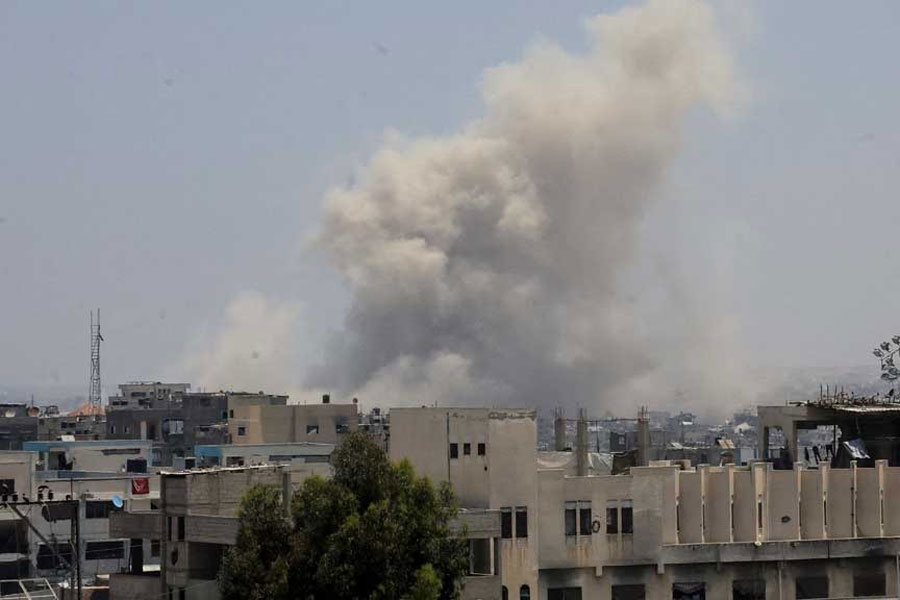
Published :
Updated :

Evacuating Bangladeshi citizens from Tehran to safer places in Iran gets underway as the Iranian capital has been under a blitzkrieg of Israeli airstrikes since Friday, officials in Dhaka said Tuesday.
Briefing the media on the evacuation move, Acting Foreign Secretary Md Ruhul Alam Siddique on the day said the current decision is that those who can remain safe by moving a certain distance away from Tehran should be relocated to safer areas.
He also informed that eight Bangladeshis who were inside the Radio Tehran building during the Israeli bombing on Monday remained unharmed.
"At this moment, there is no arrangement for leaving Iran. Air travel has been suspended, and though travel by land may be possible, it would not be safe. Hence, we have instructed them to move to safer places away from Tehran," he added.
Regarding the next steps after relocation, Ruhul Alam stated that the current initiative is to ensure temporary rented accommodation for Bangladeshis at a distance from Tehran where they would be safe.
"If later they wish to go to Pakistan or Turkey, we will help them reach there."
He also informed that due to Israeli attacks, the chancery building of the Bangladesh Embassy in Tehran is at risk, as is the ambassador's residence.
However, the Bangladesh Ambassador in Iran moved to a safe location on Monday night.
Ruhul Alam said despite the warlike situation, the embassy continued to provide services.
A hotline has been opened for Bangladeshis. The embassy is regularly updating the situation and informing the government of how other countries are evacuating their citizens.
Currently, over 2,000 Bangladeshi citizens are residing in Iran.
Foreign Ministry officials said there are around 40 people, including the ambassador, two officers, five staff members, and their families, at the Bangladesh Embassy in Tehran.
Additionally, 27 people, including 8 Bangladeshis and their families, are staying at Radio Tehran. Around 10-12 Bangladeshi students and 10 professionals live in Tehran.
Another 28 Bangladeshis were scheduled to return on June 13 but got stranded due to the suspension of flights.
Overall, there are approximately 400 Bangladeshis in Tehran.
Elsewhere in Iran, about 600 Bangladeshis have lived for over 30 years - many have married Iranian women and settled permanently.
Around 800 Bangladeshis have been working illegally in various sectors for over 10 years.
Nearly 200 students are studying in different institutions.
Ruhul Alam said many Bangladeshis married Iranian women and settled permanently. Some work in fishing and small trades in coastal areas, often without legal documentation.
A few are in detention centres. Others include professionals in media and healthcare, tourists, and students.
The acting Foreign Secretary warns that there is no sign of the Iran-Israel conflict ending soon and that the consequences for Bangladesh could be dire.
"We are aware that this war's aftermath could be highly damaging for us. We saw how prolonged the Ukraine war is and how it impacted us. The Middle East is economically very important for Bangladesh. I believe this situation could be very harmful," he told the press.
Ruhul Alam outlines several possible negative outcomes: expatriates may lose their jobs, and even if the war ends, returning to work may not be viable. "As of now, we don't see any clear signs that this war will end soon. We call on the international community to urgently end this conflict and restore peace in the Middle East. Otherwise, the consequences will be devastating."
Due to the high risk to Bangladeshis in Tehran, the government has begun the first phase of relocating them to safer areas using funds currently available at the Bangladesh Embassy in Tehran. However, further fund transfers are likely to be difficult due to inoperative banking channels.
The acting Foreign Secretary said, "It's difficult to send money. We are trying to send the required funds for the relocation. The banking channels there are not functioning, so there's some delay. The relocation process has started, and it requires substantial funding - we are trying to send it."
He added: "We'll try to send more money as soon as possible. The mission has some funds available. In this wartime situation, we're trying to get assistance from friendly countries, including Iran. We're exploring every available mechanism. But we must remember that nothing works smoothly during war."
The government is deeply concerned about the safety of around 400 Bangladeshis currently residing in Tehran. Of them, around 100 have contacted the embassy, and the process of relocating them has begun. Simultaneously, efforts are ongoing to relocate embassy diplomats, officials, and their families to safety.
mirmostafiz@yahoo.com


 For all latest news, follow The Financial Express Google News channel.
For all latest news, follow The Financial Express Google News channel.